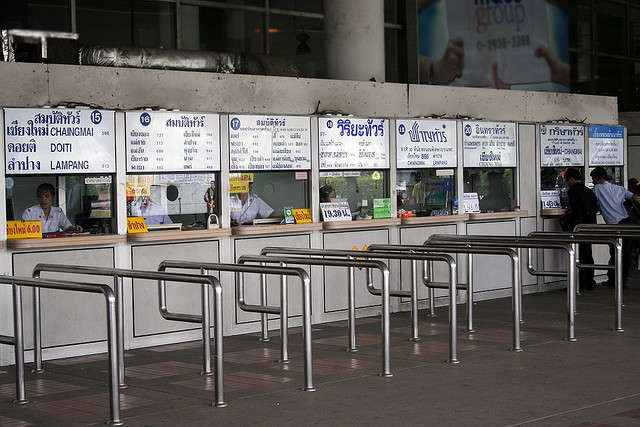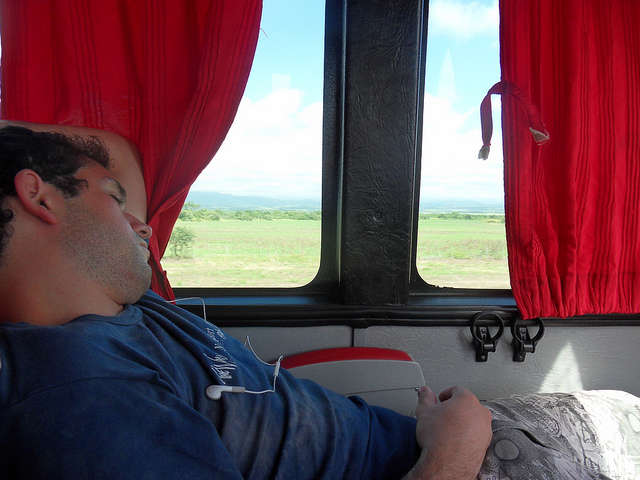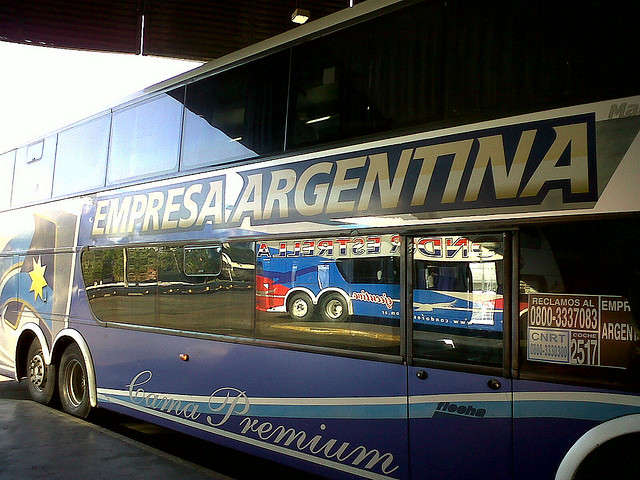Traveling overland is the preferred way of getting around for most long-term travelers. If you find yourself in mostly developing countries, it’s by far the cheapest and most efficient way of exploring a country or region. Adding flights makes your budget soar quickly, so it just makes sense to take trains, buses, and whatever other form of public transport on offer in that particular region.
If you’ve never been on a long term trip before, or if your only overland travel experience is road trips in the US, Canada, or Australia or taking the Eurail in Europe, then you might be wondering what it’s like in other parts of the world. The reality is that overland travel varies drastically all over the world, and because of the nature of overland travel, you can’t really plan for everything. You will no doubt have plenty of hilarious stories when you return, though they might not seem so hilarious at the time.
Overland travel can be tough at times. Places like Bolivia, Laos, parts of Africa, the Middle East, Southeast Asia, and India all have challenging and trying overland options. But then you enter a country like Argentina and get blown away by the quality of their buses, realizing that spending 30 hours on one isn’t even that big of a deal.
When planning a RTW trip, there are tons of things to worry about – whether or not to buy a RTW ticket, staying in hostels or hotels, what to pack, whether or not to bring a laptop or cell phone – all are items the each traveler has to consider. Unless you are traveling in high season in a popular destination or plan on buying a Eurail pass, overland travel is not something you need to concern yourself with before you leave.
But once you’re on the road, you are faced with getting from point A to point B without taking a flight. The following are questions you’ll be asking yourself once you are ready to move on.
- What’s the best way to do it?
- When do you need to purchase your tickets?
- What should you expect on an overnight bus ride?
Buying bus and train tickets

Truth be told, it does vary depending on the region, but most of the time, no matter where you are, you are usually safe turning up at the bus or train station a day ahead of departure and procuring your ticket. Obviously you want to take into account peak seasons, festivals, and once-in-a-lifetime events (like the World Cup in Brazil this summer).
We don’t condone relying on your trusty guidebook for everything, but reputable guide books like Lonely Planet and Let’s Go are great for overland travel information.
Go to the Station
Once you peruse your guidebook or the internet to learn about estimated times and prices of certain overland journeys, your best bet is to go to the station and purchase your ticket there. You’ll be tempted to use your hostel booking service or the travel agent you pass every day, but resist that temptation. Most don’t offer those services out of the kindness of their hearts, which means they charge a fee, which is to be expected. While that one time fee may not be much, it all adds up over the course of your trip.
The first time you enter a bus or train station in a foreign country, you will be overwhelmed. It’s usually crowded, sometimes hot, typically dirty, and can cause massive sensory overload. If you’re in a country that doesn’t speak your language, it can be even more confusing. Even if the attendants might not speak your language, usually there are signs to help out, and lots of pointing and gestures can be used to get your point across. Learning a few words or phrases will certainly help your situation as well. After your first few times navigating a bus or train station, it becomes much easier, and after your first month, you’ll be a pro.
Negotiating?
Negotiating for nearly everything is just the way of life in most of the world. Get used to it, particularly if you plan on spending most of your trip in developing countries. Transportation isn’t usually something that is thought of as negotiable when you’re from a western country, but you’d be surprised at how common it is.
This is when your guidebook and other resources come in handy, as you can usually find information on which countries and cities bargaining is common. Check travel blogs as well for this type of information. We were shocked when we got a bus ticket in Colombia for half of the advertised price, simply because we asked and bargained. It’s just how it works. Do your homework, and you may save yourself quite a bit.
Traveling in high season
Keep in mind that if you are traveling in a region in high season, even if bargaining is common, you probably won’t be able to negotiate a better price. In fact, prices are likely to rise in high season, during holidays, or while a festival is going on, so you always want to be aware of traveling in certain regions during certain dates.
Overland transport is also the preferred method of travel for most locals, and many locals will be traveling during these peak periods, so seats book up quickly. You will have to plan ahead in these cases, so be sure to see if you can book online anywhere or get to the train or bus station days or a week ahead of time to make plans or at least inquire about availability. These are also times where you may want to rely on a travel agent.
When it comes to buses, shop around
In many cases you will arrive in a bus station and have tons of options. Some cities and countries only have one option, and in these cases, you’re kind of stuck. But when you get to a bus station that has a multitude of companies going the same route, make sure you shop around.
Ask to see pictures of the bus, find out the route, the times it leaves and arrives, if it serves food, if there is a bathroom on board. All are important questions that may sway your decision. Don’t assume all buses are the same in quality and price – they aren’t!
Be prepared to wait

There is perhaps no better trait to learn for long-term travelers than patience.
Buses and trains typically don’t run on time in many parts of the world, so be prepared to wait. It often sucks and is frustrating, but this is a situation that is completely out of your control. The good thing is that you are traveling for a long time, so time is on your side. If you assume that your bus is going to be late departing and arriving, it will be a welcome surprise when it’s actually on time. There are plenty of things that simply don’t make sense when it comes to overland travel, so just accept it and go with the flow. Getting all up in arms about it won’t do anyone any favors.
The art of overnight travel
If you’ve never done it before, your first overland overnight journey can be daunting. You are nervous and have no idea what to expect. I remember being extremely anxious for our first overnight trip from Lima to Arequipa in Peru. If you’re a light sleeper like I am, it’s even worse. While some overnight journeys can be horrendous (La Paz to Rurrenabaque in Bolivia – I’m talking to you!), most are perfectly fine, and you come out pretty well rested.

Taking overnight buses and trains is the most time and cost efficient way of traveling through a region. You save yourself a night’s accommodation costs, and you don’t waste a day just sitting in a train or bus. But there are several tips you should adhere to in order to make your overnight journey the best it can be:
- Bring food and drinks – Many overnight buses and trains serve food as part of the ticket. Many serve food but charge. Many stop along the way for food breaks. And still many more just drive right along and make you fend for yourself. The quality and consistency varies so wildly that it pays to always be safe. You don’t want to find yourself on a 20 hour bus ride with no food or drink options. So make sure you bring some along. Bottles of water are essential. Granola bars are always good. Chips, nuts, dried fruit, fruit you can peel, even sandwiches are all great things to bring with you on a long overland journey. In some countries, you can even bring beer and wine with you, which certainly aids in sleeping!
- Have a long sleeve shirt, pants, and/or a blanket with you – It doesn’t matter how hot it is outside, always make sure you have something warm with you on the bus or train. Certain countries (hello, Colombia!) are notorious for having frigid, arctic air conditioning blasting at all times. There never seems to be an in between on buses and trains. It’s either really hot or really cold, and you never know which it will be, so come prepared for both.
- Bring a music player and/or ear plugs – No matter where you are in the world, there are inconsiderate idiots who are loud and obnoxious, not caring about anyone else around them. If you are lucky enough not to have one of these types of people on your bus or train, then there’s a good possibility there will be a television and VCR/DVD player. “Great!” you think. “Entertainment!” While the entertainment works out some of the time, in my experience, most movies shown during overland journeys are either violent, simply not good, or in another language. The one consistent thing about them is that they are LOUD. Bring something to block out all the noise if you plan on getting any sleep.
- Bring an eyemask – Sometimes you’ll want to nap during the day. Sometimes your bus or train will pass through a big, very lit up city at night. Sometimes your seat partner will keep the reading light on all night. You’ll want an eye mask in case any of these situations pop up.
- Bring a book – Some people can read while moving while some get sick as a dog. If you’re one of the lucky ones who doesn’t suffer from motion sickness, bringing a book is essential. If you have a guide book with you, this is the perfect time to start plotting out a plan for arrival – where are you going to look for a place to stay, where are you going to eat, what do you want to see while there?
- Have valuables with you – We have found that the safest way to keep track of your most valuable items – passport, credit cards, camera, laptop, iPod, etc. – is to have them with you on the bus. Don’t put them below. Having a small bag with your valuable on you at all times is a smart move, and strapping and/or locking that bag to you or your seat is also advisable.
- Be friendly – You never know what kind of conversation can be sparked up if you aren’t friendly and receptive to chatting with others, both travelers and locals alike. You’re sure to get some great suggestions on where to go, where to stay, what to see, and where to eat by just being friendly and chatting up someone next to you.
- Don’t leave shoes on the floor – Some bus drivers are absolute maniacs, and while you’ll want to take your shoes off to get more comfortable, you may want to tie them to your bag or the seat to make sure they’re not at the back of the bus when you wake up.
- Have medicine handy – If you suffer from motion sickness or are prone to having an upset stomach, having your medicine in your bag on the bus is a necessity. If there’s one place you don’t want to be sick, it’s on an overnight bus or train ride.
Safety
One of the concerns of overland travel is safety, both from shady people looking to rob tourists and accidents. Mom and dad will no doubt bring up that bus crash they saw in Peru four years ago that killed a bunch of tourists when you tell them you’ll be taking an overnight bus in Peru. And while some countries are certainly more dangerous than others when it comes to overland travel, by and large it’s safe. Just as safe as driving your car at home on a road trip. Accidents can happen everywhere, and by using common sense and avoiding the notoriously dangerous routes, you should be fine.
Theft on trains and buses is more prevalent in some areas than others. You’ll hear and read plenty about the areas that are not safe, so just exercise more caution and common sense when traveling overland there. Be diligent about keeping your valuables with you at all times. Try not taking overnight journeys where theft is more common, and always stay awake. Just being aware of your surroundings should keep your valuables safe.
Overland travel in different regions

Overland travel differs wildly around the world, but luckily for you we’ve put together a kick-ass guide for traveling overland in different regions of the world For an overview of overland travel in each region of the world, be sure to check out the guides below:
Overland Travel In The Americas
Overland Travel In Africa And The Middle East
Overland Travel In Europe
Overland Travel In Russia And Central Asia
Overland Travel In India
Overland Travel In China And Southeast Asia
Overland Travel In Australia And New Zealand
Overland travel is a great part of long-term travel, and it’s something all RTW travelers should embrace. It’s a great way to see the country you’re visiting, and it gives you the opportunity to travel with locals and have some great interactions. Some overland journeys are Heavenly, while others are straight out of Hell. But no matter what, you will certainly have plenty of stories to tell once you get home.
How often have you seen a bus driver pull over to the side of the road to bargain with two teenage boys over the purchase of two dead squirrels (ahhh, traveling overland in Laos)?
Photo credits: 1, 2,3, 4
[more link=”https://www.bootsnall.com/rtw/all-things-accommodation.html”]Next: All Things Accommodations[/more]